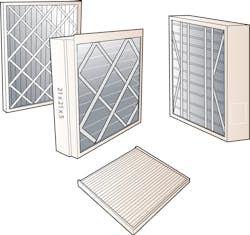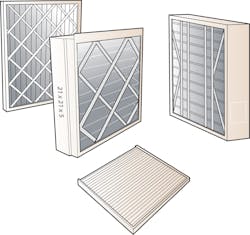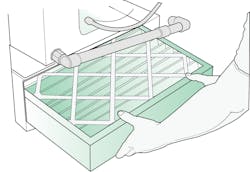Most customers want efficient air filters to remove particulates and improve their Indoor Air Quality (IAQ). Unfortunately, air filters sometimes cause poor IAQ. Let’s take a look at air filter related IAQ problems and how you can both avoid and resolve them for your customers.
It’s a challenge to write an article when you know its message may create some temporary disagreement. Nevertheless, after three decades of writing for HVAC trade magazines, I witnessed many times how disagreements can turn to understanding and produce long-term industry advancement. This happens once the principles of the issue are understood and addressed.
It’s important to look closely at the advantages and disadvantages that may be caused by air filters.
IAQ Definitions
Capturing Particulates - Most popular definitions of IAQ are extracted from technical and marketing material promoting an air filter’s ability to reduce building pollutants. This definition focuses on removing biological pollutants, mold, indoor particulate matter, pet dander, dust, and other airborne substances.
Based on this definition, your customers seek high-efficiency filtration as the solution for respiratory disease and other health issues. Or, to solve dust-related problems in their buildings.
Comfort - A more realistic and useful definition of IAQ for most consumers, focuses on comfort. For these people, IAQ may be defined as comfortable temperatures, adequate ventilation and reasonable humidity levels.
The wrong air filter often reduces a building’s comfort and deteriorates the capacity, efficiency, and performance of its heating and cooling systems. Additional problems arise as the comfort system interacts with the building.
Temperature, ventilation, and humidity are the first and more obvious IAQ elements. This idea appears to directly oppose most marketing messages. In fact, these IAQ elements are often overshadowed by air filter technical data. Nine times out of ten, issues with temperature, ventilation, and humidity are what make your phone ring, not airborne pollutants.
The wrong air filter often reduces a building’s comfort and deteriorates the capacity, efficiency, and performance of its heating and cooling systems. Additional problems arise as the comfort system interacts with the building.
Comfortable Temperatures
To deliver the required temperature into a building, a system must operate within its design parameters and equipment specifications.
Air filters, by design, are installed so that all systems airflow must pass through it. If the filter is more restrictive than the system can handle, the air filter restricts and reduces system airflow.
If the filter is more restrictive than the system can handle, the air filter restricts and reduces system airflow.
This often forces the equipment to operate outside its specifications. Filter restriction decreases its ability to deliver the right amount of heating and cooling. When system capacity decreases, comfortable conditions cannot be maintained. The system may also suffer a loss in efficiency due to excessive blower motor watt consumption.
Therefore, be aware of an air filter’s efficiency rating. Most often, the more efficient the air filter, the more restrictive it is to system airflow. If you need high-efficiency air filters, several can be installed throughout a system to greatly reduce airflow restriction.
Adequate Ventilation
Air movement is essential to comfort because it keeps the air feeling fresh and evenly delivers the required amount of heating or cooling throughout the building.
When airflow is low due to restrictive filters, the system cannot properly ventilate the building.
This causes individual rooms to lack required ventilation creating a stuffy room from the stale air. Also, a room without adequate airflow cannot deliver the required heating or cooling needed to maintain comfortable temperatures. In these cases, ventilation maybe your customer’s number one IAQ problem.
You can reduce air filter resistance by replacing existing air filters with less restrictive ones.
You can make filters less restrictive and more efficient by increasing their surface area, pleating the filter media, and building the media into a thicker frame.
The only way to know is to check the filter’s resistance to airflow using a static pressure measurement. You can find a no-cost air filter pressure test procedure at the end of this article.
Reasonable Humidity Levels
A restrictive filter can reduce humidity in a building. Lower airflow sometimes results in greater humidity removal at the coil.
As we saw earlier, filter restriction can reduce system capacity. The positive impact of this negative effect may cause the system to run longer. The longer it runs, the more it may dehumidify.
However, it requires a lot of luck for your customers to benefit from these inadvertent restrictive filter side effects. Although both these principles are technically correct, the stars rarely line up to deliver such desirable benefits. Usually your customers only notice an increase in system operating expense.
Normally, low airflow caused by a restrictive filter negatively impacts building ventilation and hurts refrigerant side performance. The outcome is increased humidity.
In heating mode, humidity often falls below the comfort level. In this case, low airflow caused by a restrictive filter may reduce heat transfer and cause the system to run longer. This causes it to lower winter humidity even more.
Normally, low airflow caused by a restrictive filter negatively impacts building ventilation and hurts refrigerant side performance. The outcome is increased humidity.
When a building is too humid or too dry, customers often claim humidity problems are their number one IAQ problem.
Building Pressures
The pressures created by an operating heating and cooling system are unseen. But the effects of building pressures that are out of balance may produce very visible and damaging IAQ effects.
For example, increasing pressures in a faulty duct system increases duct leakage. Return duct leaks introduce particulates into your customer’s buildings. This has been documented to double or triple duct leakage. Leaky ducts manipulate pressures throughout a building and may deteriorate IAQ further.
These pressure changes pull unwanted dust, dirt, insulation fibers, and pollutants into the building. Although an improved air filter is often prescribed to resolve this problem, the driving force is outside the system airstream and will not improve IAQ. In fact, it may make it worse.
Every heating and cooling system needs a good air filter. As you design, build, and maintain your systems, choose air filters wisely. Remember, the most obvious building blocks of great IAQ are comfortable temperatures, adequate ventilation, and reasonable humidity levels.
Rob “Doc” Falke serves the industry as president of National Comfort Institute, Inc., an HVAC-based training company and membership organization. If you're an HVAC contractor or technician interested in a no-cost air filter pressure test procedure, contact Doc at [email protected] or call him at 800-633-7058. Go to NCI’s website — www.nationalcomfortinstitute.com — for free information, articles, and downloads.
About the Author
Rob 'Doc' Falke
President
Rob “Doc” Falke serves the industry as president of National Comfort Institute an HVAC-based training company and membership organization. If you're an HVAC contractor or technician interested in a building pressure measurement procedure, contact Doc at [email protected] or call him at 800-633-7058. Go to NCI’s website at NationalComfortInstitute.com for free information, articles and downloads.


